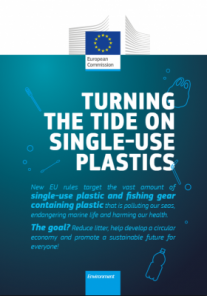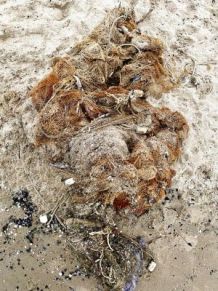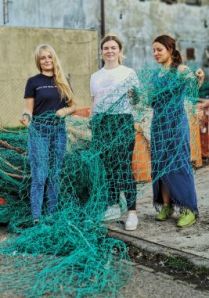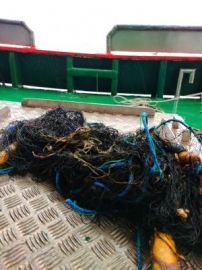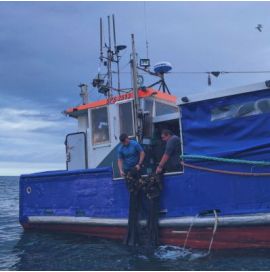
Marine litter
Marine litter (plastics and ghost nets)
Global annual plastic consumption has now reached over 320 million tonnes, with more plastic produced in the last decade than ever before. A significant amount of the produced plastic serves as single-use material and is rapidly converted into waste. Only a small part of plastic is recycled or incinerated while the majority will either be discarded into landfill or disposed as litter into the natural environment, including the world’s oceans.
Every year, an EU citizen produces on average 6 tonnes of solid waste. This gives a total amount of 2.5 billion tonnes of waste generated in the EU every year (the European Commission). The global data is even more shocking – every year, the world produces 300 million tonnes of plastic waste. To better understand the scale, we can assume that the plastic waste is equivalent to the weight of the entire human population! (UNEP)
Source: the European Commission
According to the European Commission, single-use plastics account or 50% of all waste in the seas and oceans. Most of them will remain there for centuries, breaking down into very small and difficult to remove particles, which pose great threat to the fauna and flora. Research indicates that 54% of marine species on the IUCN Red List of Threatened Species have been affected by marine litter (STAP 2011). Scientific research revealed marine litter in 100% of marine turtles, 59% of whales, 36% of seals and 40% of seabirds. The effects of ingesting plastic are various. Ingestion of plastic particles may lead to the death of an animal by blocking food intake, because indigested plastic stops the feeling of hunger. In addition, toxic substances from plastic can cause a decline in health of living organisms. Plastic bags, plastic used for packing cans and various polymer lines are also a deadly trap for marine mammals and seabirds, which often get entangled in this litter.
Lost fishing nets made of polymer fibres are a particular threat to the living organisms as they continue uncontrolled catches. In the European Member States they constitute 27% (the European Commission) of marine litter. The fishing capacity of lost nets amounts to 20% of their capacity in the first three months after loss, to reach approximately 6% after 27 months (Ghost Fishing by Lost Fishing Gear, Institute for European Environment Policy, 2005). These uncontrolled catches can have a negative impact on the living marine resources.
The decomposition time or decay of plastic waste in the seas and oceans lasts hundreds of years. As a result of salt water, solar radiation and the effect of waves, plastics turn into microplastics, i.e. particles smaller than 5 millimetres or even smaller nanoplastics. These particles, suspended in water column, enter the tissues of organisms that feed through filtering (e.g. mussels), and then enter higher elements of the food chain, such as fish and crustaceans. It is estimated that there are 5.25 trillion such particles in the seas. Decomposing plastic waste is not the only source of such particles. They are also found in different cosmetics, such as body peelings or whitening tooth pastes. Unfortunately, the existing wastewater treatment systems are not able to filter them, so when flushed into the home sewage system they enter the rivers and then the seas and oceans. According to Algalita Marine Research and Education Foundation sea water contains 6 times more plastic than plankton.
It is very difficult to accurately estimate the amount of litter in the seas. According to the United Nations Environment Programme (UNEP) up to 70 % of the marine litter that enters the sea ends up on the seabed, 15% floating near the surface and another 15% suspended in the water column. Most of the litter in the oceans remains invisible to us and can be found even at the bottom of the Mariana Trench, the deepest point on Earth.
However, the amount of litter in the seas and oceans and its impact can be reduced. The amount of marine litter reaching the marine and coastal environment should be reduced significantly by the prevention or reduction of the generation of solid waste and improvements in its management, including collection and recycling of litter, as well as its removal from the seas.
On 3rd July 2021, in accordance with the EU "Single-use plastics" Directive we were to say goodbye to single-use items, among others: cutlery, plates, straws, cotton buds, drink stirrers, balloon sticks and styrofoam food containers. In addition, the Directive limits the use of other plastic items, such as hygiene products. It is required to indicate the producer responsible for ensuring the recyclability of the product. Unfortunately, the Polish law has still not complied with the EU regulations, despite a two-year period to prepare the introduction of the new rules. The Ministry of Climate and Environment explains that the late publication of the implementing guidelines by the European Commission had caused delays in the legislative process in Poland. At present, the work on the Regulation are still ongoing.
The MARE Foundation actively participates in this work and conducts extensive communication activities aimed at educating the public about the problem of marine litter, as well as building the awareness and social sensitivity towards this problem. In addition, to help overcome the problem of marine litter, Polish fishermen organisations in cooperation with the MARE Foundation conducted two editions of a project called “The Clean Baltic”. The aim of the project was to retrieve marine litter from the sea, in particular derelict fishing nets (so-called ghost nets).
In 2017, the retrieval actions were conducted by vessels from five fishermen organisations. Over 500 fishing vessels, up to 12 meteres in length, participated in the project. 147 tonnes of marine litter were removed from the sea.
In 2020-2021, nine Polish fishermen organisation took part in the second edition of the project. During the period of 16 months, fishermen removed in total over 160 tonnes of marine litter. The retrieved debris included mostly derelict fishing gears, tyres and different types of single-use plastic items.
Read more about the projects at: Clean Baltic 2017 and Clean Baltic 2020. Videos from the projects are available at the dedicated YouTube channel.
At the MARE Foundation, we believe that raising awareness is a crucial step towards real change, therefore we educate and encourage people to make responsible choices that are good for the environment. It has become our tradition to clean the Tri-City beaches in the framework of the World Clean Up Day. We cannot clean the entire coast during one day per year, but the commitment we observe allows us to believe that the educational value of this action cannot be overestimated. In accordance with the concept of leaving the beaches cleaner than we had found them, waste removal is also associated with our educational actions related to the Baltic.
We encourage everyone to implement such approach on a daily basis. Every one of us can pick up at least one garbage during a walk along the beach, in the forest or on the street.
Plastic litter is also a huge problem in ports and marinas. Therefore, the MARE Foundation has initiated the installation of marine litter bins, which facilitate the removal of floating litter directly from the water. One bin can collect up to 1.400 kg of litter annually. So far, we have installed 5 bins along the Polish coast and plan on installing more in the near future! Read more at: MARINE LITTER BINS.
What can YOU do?
- Do not use single-use plastic items, such as plastic bags, straws, plastic cups, cutlery etc. We have several reusable alternatives a tour disposal, so why not use them? And if you leave the shop with a plastic bag, use it again.
- Invest in a bottle/jug with a filter and drink tap water.
- Collect garbage – when you see a piece of garbage on the sidewalk, beach, lawn - pick it up and put it in the trash. This will be a small effort for you and will bring immediate change to your surroundings.
- Segregate waste properly by checking the instructions on the packaging. Plastic can have more than just one life.
- Buy less – this is good for the planet and your wallet 😉
- Are you introducing eco-changes into your life? Super! Educate others and share what you do. You can be an inspiring example!

